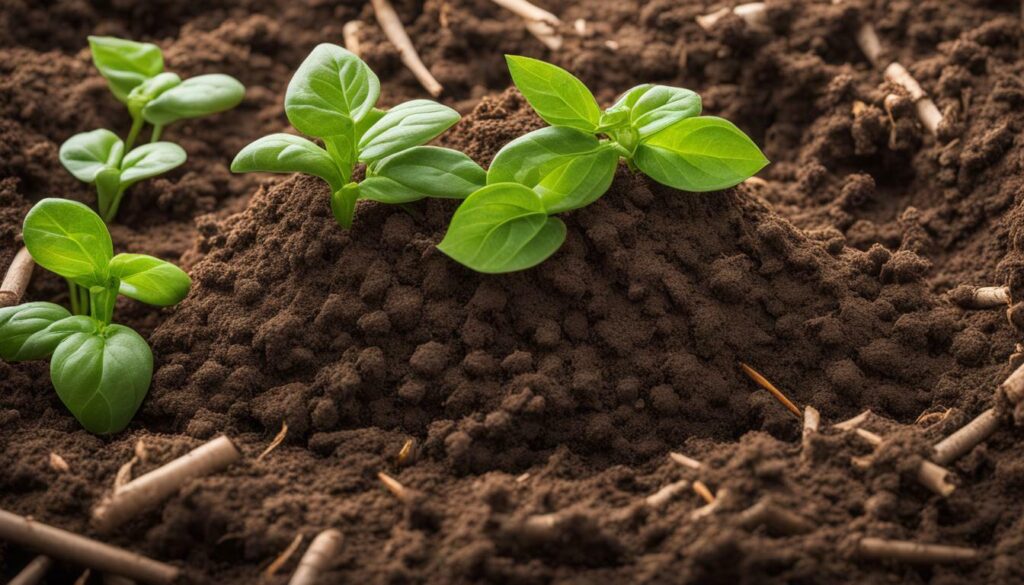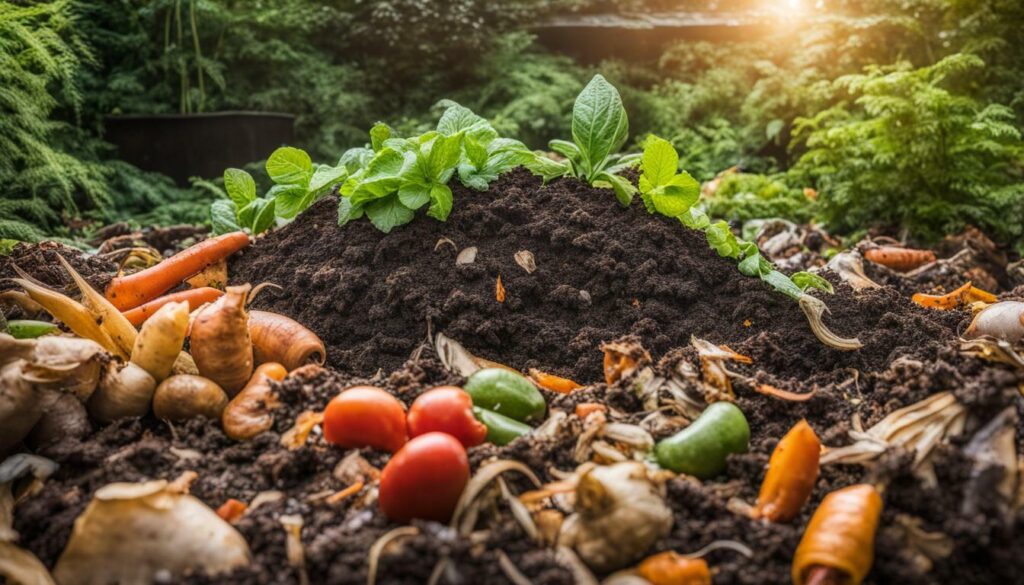Composting is a natural process that involves the breakdown of organic material into nutrient-rich soil. When done correctly, composting can have a significant impact on water quality by reducing chemical fertilizer use and improving soil structure, leading to cleaner water sources.
Composting is an environmentally friendly way to manage organic waste, diverting it from landfills and reducing greenhouse gas emissions. By enriching soil with nutrients and beneficial microorganisms, composting helps improve soil health and prevent erosion, reducing the transport of pollutants into water sources.
Key Takeaways:
- Composting is a natural process that can improve water quality by reducing chemical fertilizer use and improving soil structure.
- Composting is an environmentally friendly way to manage organic waste, diverting it from landfills and reducing greenhouse gas emissions.
- Composting enriches soil with nutrients and microorganisms, improving soil health and preventing erosion, leading to cleaner water sources.
The Connection Between Composting and Water Quality
Composting is a sustainable practice that can improve water quality by reducing the need for harmful chemicals that can pollute water sources. Organic matter in compost enhances soil structure and prevents erosion, leading to cleaner water.
Composting reduces the need for chemical fertilizers and pesticides that can leach into water sources, resulting in pollution. When using compost, there is less of a need to apply synthetic fertilizers that contain high levels of nitrogen and phosphorus. These nutrients are the primary contributors to water pollution, and by reducing their usage, composting significantly improves water quality.
The role of compost in enhancing soil health also contributes to cleaner water. Healthy soil can retain water better, which reduces water runoff, erosion, and the transport of pollutants. Compost is rich in organic material and beneficial microorganisms that can improve soil health and ultimately, water quality.
The Importance of Composting for Water Quality
Composting plays a crucial role in water quality improvement by reducing pollution and enhancing soil health. It is a sustainable practice that has a positive impact on the environment.
By reducing the amount of organic waste that ends up in landfills, composting can prevent leachate contamination, which can harm water sources and underground aquifers. The decomposition of organic waste in landfills produces methane, a potent greenhouse gas that contributes significantly to climate change. In contrast, composting produces significantly less greenhouse gas emissions than landfilling.
Furthermore, composting conserves natural resources by reducing the need for synthetic fertilizers and pesticides. By diverting organic waste from landfills, composting helps mitigate the effects of climate change, protect the environment, and improve water quality.
Composting as a Solution for Improving Water Quality
Composting is a natural and effective solution for addressing water pollution. By reducing the amount of organic waste sent to landfills, composting helps prevent the contamination of groundwater and surface water sources with leachate. Additionally, composting can provide a source of nutrient-rich soil amendment that can be used for growing plants, thereby reducing the need for chemical fertilizers that can contribute to water pollution.
One of the key benefits of composting is its ability to reduce nutrient runoff. When organic matter is added to soil in the form of compost, it helps to retain water and nutrients, preventing them from leaching into nearby waterways. This reduces the amount of nitrogen and phosphorus that can contribute to harmful algal blooms and dead zones in lakes and oceans.
Composting also plays an important role in preventing erosion and improving soil structure. Healthy soil promotes the growth of vegetation, which helps to retain water and prevent soil from washing away during heavy rain events. This reduces the transport of pollutants such as sediment, pesticides, and nutrients into nearby water sources.
Moreover, composting can be used as a low-cost alternative to traditional stormwater management practices. By adding compost to rain gardens or green roofs, for example, the compost can help to filter pollutants and reduce the volume of stormwater runoff that enters waterways.
In summary, composting is a valuable tool for improving water quality. It reduces nutrient runoff, prevents erosion, and provides a source of natural soil amendment that can help reduce the use of chemical fertilizers. By promoting composting as a sustainable practice, we can help protect our water sources and contribute to a healthier planet.
Composting and the Environment
Composting is not only a solution for managing organic waste but also has a positive impact on the environment. By diverting food and yard waste from landfills, composting reduces greenhouse gas emissions and the volume of waste that ends up in landfills. According to the US Environmental Protection Agency (EPA), landfills are one of the largest human-made sources of methane gas, a potent greenhouse gas that contributes to climate change. Composting also helps reduce the need for chemical fertilizers that can pollute water sources.
Composting plays an essential role in mitigating climate change and conserving natural resources. As an alternative to conventional waste disposal methods, composting reduces the pressure on landfills and helps create a circular economy. Composting is a natural process that transforms organic material into a nutrient-rich soil amendment, replacing the need for synthetic fertilizers and pesticides. Moreover, composting enhances soil quality by improving soil structure, increasing water retention, and promoting healthy soil microorganisms.
Composting is a sustainable practice that benefits the environment and promotes a more circular economy. It reduces waste, improves soil quality, and helps prevent water pollution, among other benefits.
How Composting Enhances Soil Health
Composting has a direct impact on soil health, which, in turn, can improve water quality. Compost adds essential nutrients to soil and supports the growth of beneficial microorganisms.
When added to soil, compost increases its organic matter content, which improves soil structure and water retention. As a result, soil that has been enriched with compost is less prone to erosion and can better absorb and filter water, reducing the amount of pollutants that reach water sources.
Composting Techniques for Water Quality Improvement
Composting is a simple and effective way to improve water quality. By composting organic waste, individuals and communities can reduce the amount of pollution in water sources. Here are some tips for composting techniques that promote water quality improvement:
- Proper composting methods: To prevent contamination, it’s essential to follow proper composting methods. This includes maintaining the right balance of carbon and nitrogen, keeping the compost moist but not wet, and turning the compost regularly to promote aeration and decomposition.
- Aerated static pile composting: This is a technique that involves using a large machine to mix and aerate the compost. This method is ideal for large-scale composting projects and produces high-quality compost in a short amount of time.
- Vermicomposting: This composting technique relies on worms to break down organic waste. Worms consume the waste and produce nutrient-rich castings that can be used as fertilizer. Vermicomposting is an excellent option for those with limited space or who want to compost indoors.
By choosing the right composting method and following best practices, individuals and communities can reduce the amount of pollution in water sources and promote a healthy environment.
Composting and Agricultural Practices
Composting has a critical role to play in sustainable agricultural practices and its impact on water quality cannot be overstated. By reducing the need for synthetic fertilizers and pesticides, composting contributes to healthier soils and cleaner water.
The benefits of using compost on farms are numerous. Compost improves soil structure and water retention, which reduces nutrient runoff and soil erosion that can lead to water pollution. Healthy soil also supports healthier crops, which can lead to higher yields and profits for farmers.
Organic farming practices, which rely on compost instead of synthetic fertilizers and pesticides, are gaining in popularity due to their long-term sustainability. By building healthy soil through composting, organic farming contributes to improving water quality for generations to come.
Composting in Urban Environments
Composting is not limited to rural areas; it can have a significant impact on water quality in urban environments as well. Urban areas have a high demand for food and produce a considerable amount of organic waste that can be composted to reduce the burden on landfills.
The benefits of composting in urban areas go beyond improving soil health, reducing waste, and saving money. Composting in cities can help mitigate the impact of stormwater runoff, which can pollute water sources.
Urban areas often have impervious surfaces, such as concrete and asphalt, that prevent rainwater from infiltrating the ground. Instead, stormwater flows over these surfaces and picks up pollutants, including chemicals from cars and buildings.
Composting can play a role in reducing the amount of stormwater runoff in urban areas. Compost can be used as a soil amendment to increase the soil’s ability to absorb water, reducing the amount of runoff and filtering out pollutants in the process.
The use of compost in urban agriculture is also gaining popularity, offering a sustainable solution to growing food in cities. Incorporating compost into urban gardens and farms can improve soil fertility and reduce the need for synthetic fertilizers and pesticides that can harm water quality.
Community composting initiatives are also gaining traction in urban areas, providing composting opportunities for households and businesses. These initiatives not only reduce waste and improve soil health but also bring communities together to work towards a common goal of sustainability.
Overall, composting in urban areas offers a multitude of benefits, including improving water quality, reducing waste, and promoting sustainable agriculture. As cities continue to grow, it is essential to incorporate composting into urban planning and encourage its adoption as a sustainable practice.
The Future of Composting and Water Quality
The potential for composting to improve water quality is vast, and its use is likely to increase in the coming years. As more individuals and communities become aware of the benefits of composting, more organic waste will be diverted away from landfills and into compost systems.
Education and awareness programs will play a crucial role in promoting composting practices. Municipal governments can also introduce policies and incentives to encourage composting, such as offering discounted compost bins or providing free compost to residents.
Composting can also be integrated into agricultural practices, reducing the need for synthetic fertilizers and pesticides that can contaminate water sources. Organic farming practices can benefit from the use of nutrient-rich compost, leading to healthier soils and cleaner water.
As urbanization continues, there is an opportunity for composting to improve water quality in cities. Community composting initiatives can provide an alternative to traditional waste disposal methods and reduce the burden on municipal waste management systems.
In conclusion, composting has a vital role to play in improving water quality and protecting the environment. As individuals and communities embrace composting practices, we can create a more sustainable future for generations to come.
Conclusion
Composting is a sustainable practice that has numerous benefits for water quality and the environment. As discussed in this article, composting helps to reduce the need for chemical fertilizers that can pollute water sources. Additionally, composting enhances soil structure and reduces erosion, leading to cleaner water.
Composting can also be utilized as a solution to address water pollution. It reduces nutrient runoff and prevents leachate contamination. Further, composting reduces greenhouse gas emissions and landfill waste, which helps to mitigate climate change and conserve natural resources.
By enriching soil with organic matter and beneficial microorganisms, composting indirectly improves water quality. Healthy soil reduces water runoff, erosion, and the transport of pollutants.
Proper composting techniques are essential to prevent contamination and promote water quality improvement. Aerated static pile composting or vermicomposting are effective techniques that can be used.
In sustainable agriculture, composting reduces the need for synthetic fertilizers and pesticides, which contributes to healthier soils and cleaner water. The benefits of using compost in organic farming practices are also significant.
Composting in urban areas provides opportunities for water quality improvement, although challenges exist in terms of implementing composting systems. Community composting initiatives have a positive impact on local water sources.
The future of composting looks promising, with increased adoption of composting practices leading to improved water quality. Education and awareness programs are necessary to promote composting, and potential policy changes and incentives may encourage composting practices.
In conclusion,
composting is a simple, effective, and sustainable way to improve water quality and protect the environment. By exploring composting as a daily practice, individuals can contribute to a healthier planet.



